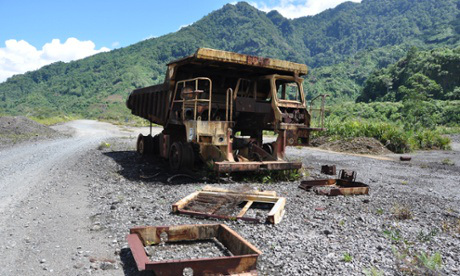NGO report claims there is widespread mistrust of discussions around PNG copper mine reopening, but Bougainville president and landowners say report is flawed
Helen Davidson | The Guardian

A rusted truck remains at the Panguna copper mine that was shut down after villagers Papua New Guinea’s autonomous region of Bougainville fought a decade-long civil war. Photograph: Ilya Gridneff/AAP
Backers of the reopening of the Panguna copper mine in the autonomous Bougainville region of Papua New Guinea have defended their community consultation processes and attacked a report criticising their actions.
The report by Jubilee Australia, an NGO, canvassed opinions in 10 villages surrounding the copper and gold mine – a Rio Tinto-owned project by Bougainville Copper Limited (BCL) which was at the heart of the island’s decade-long civil war. The mine, which was the largest of its type in the world when operating, closed in 1989.
The report, launched in Australia this month by the Greens leader, Christine Milne, Labor MP Melissa Parke and independent MP Cathy McGowan, found that resentment and mistrust of PNG defence forces, Australia and BCL because of their roles in the conflict, had led to mistrust of discussions around reopening the mine.
The research was conducted anonymously at the end of 2013 and spoke to 65 people individually and one group of 17 people in Bougainville. Jubilee’s chairman, Luke Fletcher, told Guardian Australia that while there was a risk of self-censorship among respondents, Jubilee’s findings were “certainly enough to question the main narrative” of widespread support for the mine as a source of national revenue.
However, the president of the Autonomous Region of Bougainville (ABG), John Momis, disputed many of the report’s claims including that the voices of mine-affected communities had been distant from discussions which began in 2009.
“There may indeed be individuals who have not been able to, or have chosen not to, participate in consultations,” Momis said in a statement.
He said the ABG had “extremely limited resources” and faced geographical and political barriers, including a 17-year-long armed roadblock restricting government access to the Panguna area.
Momis accused the report’s authors of seeking out people known to be opposed to the mine. He said while there were individuals and communities in opposition, “nothing in Jubilee’s report substantiates this gross overgeneralisation and misrepresentation.”
“The overwhelming response is support for reopening the mine, but only if it can be done in a way that avoids the extremely negative effects of earlier mining and ensures that Bougainvilleans receive a fair share of mining’s benefits’, said Momis.
Interviewees quoted in the report spoke of a deep mistrust of BCL in running the mine again, and of fear that it would lead to a repeat of the environmental and social damage and see a return to violence.
“BCL has a lot to do in terms of reparation for what it did to us. When did BCL admit its wrongs? And now it is trying to come back; mining is not a negotiable issue,” said a woman from Guava.
Others expressed tentative support under strict conditions or different ownership.
In a letter to Jubilee, the association executives for nine mine-affected landowner groups said they did not understand why the research was done secretly.
“They did not ask us for information to help the research be accurate, so they didn’t know about the many different kinds of consultation for our people about the future of mining held over some years.”
A negotiations adviser to the ABG, Ciaran O’Faircheallaigh told Guardian Australia that he believed there was little risk of retribution to people voicing an opinion against the mine. He said the consultation process had been transparent, and provided a platform for dissenting opinion.
“All the forums – the women’s forum, the region forums and so on – have all been broadcast live,” he said.
“If there was any activities designed to intimidate people or any attempt to intimidate people it would be very quickly and widely known. Bougainville is a small place.”
O’Faircheallaigh said among those who spoke were people who were staunchly opposed to the mine, but the majority supported it with conditions.
In his letter to the Jubilee board, Momis said the ABG “is committed to social and environmental baseline studies and negotiations being undertaken to establish whether it is possible to reopen Panguna in a way that satisfies these conditions. If they cannot be satisfied, the ABG opposes reopening the mine.”
Brynnie Goodwill, CEO of Jubilee Australia told Guardian Australia: “the board is considering its response to the comments by president Momis and the landowners,” however “the purpose of the research was to support the airing of voices of mine affected communities, to explore in depth issues that may have been lingering since the closure of the mine and civil war, and to ensure those voices could become part of a broader discussion and debate.”
- Elizabeth1's blog
- Log in to post comments
